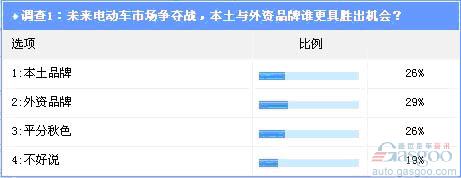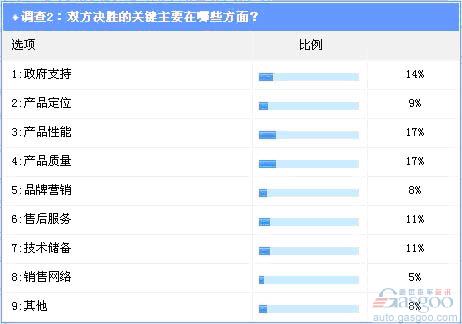The government's determination to develop new energy vehicles, especially pure electric vehicles, has caused Chinese domestic auto brand makers to take advantage of this "curve" overtaking. At the same time, China's consumer market, which continues to grow rapidly, and foreign-funded companies that are equally optimistic about the government's supportive position, are also trying to seize the opportunity to eat China's electric vehicle market, which is becoming bigger and bigger. In the eyes of the industry, Chinese domestic manufacturers are pushing the industrialization of electric vehicles with unprecedented actions. The formation of electric vehicle alliances at different levels shows that from the central government to the local government, organizations and enterprises have become more systematic, and the synergy effect of the combination of production, education and research has taken shape. However, while optimistic expectations are expected in the market, local manufacturers still have to face a great market test in the face of the surging momentum of auto giants from Europe, the United States, Japan and other countries. As early as the 1960s and 1970s, large countries such as the United States and Japan began to formulate new national energy strategies, trying to get rid of excessive reliance on oil resources and establish a new energy vehicle strategy under the national strategy (focusing on electric The car sector also started immediately. In 1971, Japan took the lead in the formulation of the “Electric Vehicle Development Plan†and encouraged companies to increase investment in R&D for electric vehicles. The Californian government began to promote electric vehicle projects almost at the same time. Although the plan failed to achieve the desired results, a group of companies including General Motors have accumulated rich experience in research and development and have relatively sufficient technology reserves. Since 2007, in the area of ​​new energy vehicles, the US federal government has allocated a total of nearly US$30 billion in funds to support the development of related industries. This figure far exceeds the Chinese government’s financial subsidies for the industry at this stage. At present, GM and Nissan, two multinational companies with the world's most electric vehicle development capabilities, have successively decided to introduce their respective Chevrolet VOLT and LEAF models to the Chinese market in 2011, reflecting that the Chinese market has a presence in foreign companies. The great attraction. On the other hand, it indicates that China's electric vehicle market will become one of the biggest targets for global vehicle manufacturers to compete for food after the traditional fuel vehicle market. According to a preliminary statistics of the “Electric Vehicle Strategic Plan†of professional automotive information provider Gasgoo.com.cn before the Chinese OEMs that have electric vehicle development projects in China and foreign companies that have launched electric vehicle programs for the Chinese market. It is expected that by 2012, there will be nearly 30 electric vehicles in the Chinese market (including imported models, as shown in the table below), which will usher in the highest density of electric vehicles in the world. As we have analyzed before, on the premise that the key technologies of the key components of electric vehicles have not been completely broken, plus the infrastructures such as charging equipment are still being planned and constructed, whether the above companies will follow the plan to promote electric power in the last two years. The listing process of models is not very optimistic at present. However, this sent a clear signal to car manufacturers in other regions that the Chinese electric vehicle market is in full swing. BYD, the Chinese domestic manufacturer, has begun to sell its F3DM models. Another E6, a pure-electric model, was also delivered to a local taxi company in Shenzhen in May this year for trial operation. It is on the eve of mass production. According to the first phase of Gasgoo Online Week on the future of the auto market, a total of 2,146 auto industry participants were invited to participate in the survey (please click on the industry survey to determine the success of the auto market ). The results show that about 57% of the total number of voters People believe that a battle for market share of electric vehicles between domestic manufacturers and foreign companies will erupt in the next five to 10 years. Another set of data from the survey shows that the product's performance, quality, and positioning will become the key to the competition between the two parties, with voting percentages of 17%, 17%, and 9%, respectively. Since the start-up time of the Chinese traditional auto industry was more than a half century after the development history of the world auto industry, it is very difficult for local manufacturers to surpass the market in the traditional fuel auto industry. In comparison, although electric vehicles were invented by humans earlier than fuel-powered cars, the history of being seriously valued and effectively developed by all countries in the world is also three to four decades. In view of this, it is considered that they have not completely lost in the “starting lineâ€. The Chinese government and manufacturers are betting on the electric vehicle industry. This is not an irrational gamble. Chinese local manufacturers already hold certain chips in their hands. First of all, in the aspect of fuel cell vehicles, related integrated vehicle integration technologies have developed rapidly. The prestigious universities Tsinghua University and Tongji University had previously developed fuel cell cars (over one, two, three series) and fuel cell buses in the national "Eleventh Five-Year Plan" development plan with the help of the "863" project and conducted demonstration operations. And gradually began to improve the corresponding parts and components supporting enterprises. Secondly, as a world's largest producer of rare earth resources, the Chinese government has focused on encouraging the development of rare earth permanent magnet motors, making comprehensive use of the resource advantages in the basic materials field, and reducing the cost of vehicles for future industrialization, and it is highly economical. Third, in terms of electronic control systems, electric motors and their control technologies are used as the core technologies of electric vehicle systems, such as brushless DC permanent magnet motors, switched reluctance motors, and electronic speed control technologies. Some Chinese manufacturers produce suitable vehicle power. The quality of permanent magnet motors has been relatively mature, and has a high practical value, and has formed export capabilities. Finally, the core battery technologies that have attracted the attention of the outside world, China's vehicle manufacturers, parts developers and battery manufacturers have also mastered a certain amount of research and development capabilities. According to the major electric models announced in the above table, most domestic companies have introduced lithium iron phosphate and lithium-ion batteries in their models, and have a cruising range of up to 300 km. For General Motors, Chevrolet Volt, who is known as “no rivalâ€, Yuan Tao, general manager of Chery Automobile New Energy Corporation, one of the representatives of local manufacturers in China, confidently announced in an interview that he has mastered the core technology of the extended-range electric vehicle. "As soon as the first half of next year, Chery will launch China's first electric vehicle with an increase in program size." Under the guidance of the policy, the extent to which huge amounts of capital investment will stimulate the company's ability to innovate is evident. At the same time, it also shows that after the cultivation and development in recent years, the local Chinese manufacturers' R&D capabilities have changed dramatically. Therefore, for Chinese domestic manufacturers, the performance and quality of electric vehicle products are not entirely at a disadvantage compared with their competitors, and it cannot be asserted that they will continue the competitive landscape of the traditional fuel car market and erode at the low end of the market. To earn a meager sales profit. On the other hand, under the government's financial subsidies and low-cost traditional advantages, Chinese domestic manufacturers can have more room to launch electric vehicles suitable for different consumer segments. The potential advantages of low-cost competition are also expected to be in the electric vehicle market. Be fully tapped. For the next 5 to 10 years, the price advantage of China's domestic electric car products will be the sharpest weapon to cut into the market. The human society needs to grow and prosper on the earth for a long time. Energy-saving and emission-reducing electric vehicles that are “zero in pollution†will undoubtedly eventually replace the prevailing fuel vehicles. We believe that with the continuous development of the economy and the maturity of the market, the temptation of the future of China's electric vehicle market is likely to be magnified several times on the basis of the current situation. Local manufacturers and foreign brands are in the field. Competition will also be even more fierce. Gasgoo.com survey results show that in the next 5 to 10 years, in the first battle of the electric car market in China that is expected to start, those who are optimistic about local and foreign brands account for 26% and 29% of the total number of voters, respectively. Twenty-six percent of people believe that the two sides will "half an equal share." From this, we can indirectly conclude that the Chinese auto industry is not completely bearish on domestic manufacturers' R&D capabilities and competitiveness in the field of electric vehicles. Unlike the current era of internal combustion engines, local companies are considered to be “migrant workers in foreign brandsâ€. ". Overall, despite some of the early advantages in the field of electric vehicles, Chinese domestic manufacturers are still vulnerable, but once we grasp this fleeting strategic opportunity, we believe that “curve†overtaking is not just a matter of days and nights. Tan. The survey data is as follows: Auger Conveyor,Twin Shaft Screw Conveyor,Twin Shafted Screw Conveyor,Double Shafted Screw Conveyor Quantum Conveying Systems Yangzhou Co.,Ltd. , https://www.fkconveyor.com.jpg)
The corresponding parts and components supporting enterprise chain is also in progress. According to statistics, China's research on fuel cell vehicles began in the early 1990s. A number of central enterprises and state-owned enterprises participated in the research and accumulated rich experience in R&D. 

